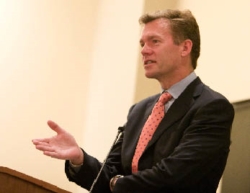Dateline’s Hansen addresses educators on online dangers
NEWTON -- Like Catholic educators at the 12th annual SPICE Conference, Chris Hansen of Dateline NBC’s “To Catch a Predator” seeks to inform young people as well. Raising awareness and debunking myths about sexual predators has been the purpose of the 11 reports he has worked on thus far, he said.
“What was stunning to me was that these guys didn’t have the word ‘predator’ tattooed across their foreheads. They looked like a guy who could be standing next to you at the grocery store or the dry cleaners,” Hansen said in his June 22 keynote address at the Selected Programs for Improving Catholic Education (SPICE) Conference held at Boston College.
The conference is organized by Boston College in collaboration with the National Catholic Educational Association (NCEA), which serves over 200,000 Catholic educators nationwide. It is aimed at providing assistance to Catholic school administrators and staff by showcasing effective programs in place at Catholic schools throughout the country.
The topic of the 2007 conference was “Kids on the Edge: The Perils and Potential of Media and Technology in Catholic Education.” It was held in BC’s Corcoran Commons June 21-23.
The conference’s first full day, June 22, was devoted to the potential dangers of technology. The following day, educators were encouraged to look at the ways technology could enhance the Catholic identity of their schools. Throughout the conference, educators were encouraged to use BC’s technology, including laptops, a message board set up specifically for participants and interactive “clickers,” remote control-like devices that allowed the conference participants to give real-time feedback to questions posed during presentations.
In addition to Hansen, this year’s speakers included BC associate professor Michael Russell, an FBI agent and a parent whose child was lured into danger via the Internet.
Hansen, who lives in Connecticut, has received four Emmys, four Edward R. Murrow Awards and awards for excellence from the Associated Press and United Press International. He has covered child labor in India, drug gangs and airline safety. Over the last three years, he has filmed 11 segments of “To Catch a Predator.”
In each episode, adults posing as underage girls or boys arrange to meet online predators at a house wired with hidden video cameras. Once the men arrive, Hansen and a camera crew confront them and Hansen questions them about their activity. The first segment of “To Catch a Predator” was filmed on Long Island and 17 men came to the house in two-and-a-half days. After the first two episodes of the program authorities were brought in so that the perpetrators could be apprehended immediately.
The 11th installment of the program has been taped and will soon air. Hansen said that with the volume of online predatory activity he could film 11 more.
Hansen related to Catholic educators what he has witnessed during those investigations. He said teachers, doctors and firemen have been caught. Two men have shown up naked and one brought his 5-year-old son with him. Now, many of the men have seen “To Catch a Predator” and recognize Hansen when he emerges from behind closed doors. One man told him, “I never miss a program,” Hansen said.
Dan Curtin, executive director of the NCEA’s department of chief administrators of Catholic education, said that Catholic educators need to be informed about online dangers in order to help their students.
“Technology is so powerful,” he said. “There are many, many fine things we can do with technology but there are also a lot of dangers out there, and we need to be aware of that as Catholic educators.”
Hansen, who has two teenage sons in Catholic school, agreed. The best line of defense is to talk to children about the dangers on the Internet and promote parental involvement, he said.
Hansen also urged setting rules for children like not talking to people online that they do not know in real life, limiting their time spent online and keeping computers in an area where use can be monitored.
Finally, while children should not be scared unnecessarily, sometimes they need to hear a story that illustrates potential online danger, he said.
Hansen told the story of a daughter of a police officer who was messaging a man whom she met in a Christian chat room. He claimed to be a teenage surfer from San Diego but turned out to be a 47-year-old who abducted, sexually assaulted and murdered her.
“Over the course of several months he was able to figure out where she lived, what her routine was,” he said. “Here’s a case where the daughter of a police officer thought she was doing everything right and this guy was able to figure it out anyway.”
Attending the conference for the second time, Carol Geddis, executive director of the Catholic School Administration Association of New York State, said that information about online predators should be a component in every technology class. Parents, too, need to be educated on Internet safety, she said.
Fred Herron, a director of adult faith formation in New York, said that the SPICE Conference is an excellent place to gather information on timely topics.
“There’s always something useful to Catholic education. They pick excellent topics,” he said.



















